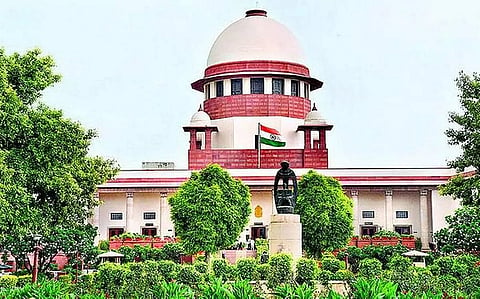
- Home
- Live Blog
- Breaking News
- Top Headlines
- Cities
- NE News
- Sentinel Media
- Sports
- Education
- Jobs

The row started when students wearing hijab were stopped from entering the premises of an educational institution in Karnataka. Following which, the Karnataka government put a blanket ban on hijab on campus. The Muslim students of the state challenged this decision of the state government in the Karnataka High court. But they refused to overturn the ban and mentioned it to be "(clothes) that disturb equality, integrity and public order in schools and colleges." When the Karnataka High Court refused to remove this ban in a verdict given on March 15, the students decided to challenge the decision in the Supreme Court of India.
The case came to the hands of two judges of the Supreme Court namely Justice Sudhanshu Dhulia and Justice Hemant Gupta. After hearing all the pleas and studying all necessary documents, the court gave a split verdict and called for a larger bench to take up the matter. While Justice Hemant Gupta backed the hijab ban in the state, Justice Sudhanshu Dhulia disagreed. Strong remarks came from both judges as they pronounced their verdict.
Justice Dhulia stressed on secularism, constitutional freedoms, and enabling girls' education. "Amongst many facets of our Constitution, one is Trust. Our Constitution is also a document of Trust. It is the trust the minorities have reposed upon the majority. It is necessary to have discipline in schools. But discipline not at the cost of freedom, not at the cost of dignity. Asking a pre-university schoolgirl to take off her hijab at her school gate, is an invasion of her privacy and dignity," Justice Sudhanshu Dhulia mentioned.
Referring to the constitutional freedoms on secularism and education, he questioned if this ban can improve the life standards of the girl child. "One of the best sights in India today is that of a girl child leaving for her school in the morning, with her school bag on her back. She is our hope, our future. But it is also a fact that it is much more difficult for a girl child to get education, as compared to her brother," Justice Dhulia noted and questioned "All the petitioners want is to wear a hijab! Is it too much to ask in a democracy? How is it against public order, morality or health? Or even decency?."
Justice Hemant Gupta mentioned secularism is applicable to all citizens. So representatives of only one community wearing religious symbols is an "antithesis to secularism".
"The religious belief cannot be carried to a secular school maintained out of state funds. It is open to the students to carry their faith in a school which permits them to wear hijab or any other mark, may be tilak, which can be identified to a person holding a particular religious belief but the state is within its jurisdiction to direct that the apparent symbols of religious beliefs cannot be carried to schools maintained by the state from state funds," Justice Hemant Gupta said.
Justice Gupta raised the following questions in his order:
"The answer, according to me, is against the appellant. I dismiss the appeal," Justice Gupta concluded.
Also Watch :